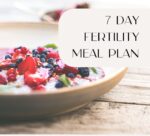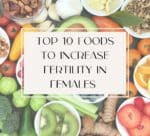Nutrition & Fertility success
How much can nutrition boost your odds?
You may be asking yourself, “How much can nutrition really make a difference in my fertility journey?” Great question and I have some answers for you! In this article, I break down the numbers for you that is from the studies, and I’ve referenced them for you at the bottom.
So, on that, please read on so you can learn the numbers and make the decisions for you on your fertility journey. And one more thing to think about – these numbers are based on 1 nutrition factor, so just imagine if you do more than one. That, imo, is worth a few moments thought….
The fertility & nutrition numbers
1. Improving Ovulatory Function
One of the key factors influencing female fertility is ovulation. Due to this, there are lots of studies out there investigating it. As a summary here, I will tell you that studies say females who adopt a diet rich in certain nutrients experience “remarkable improvements in their ability to ovulate.”
- A high intake of healthy fats from for ex) extra virgin olive oil can increase ovulatory fertility by up to 27%.(1)
- Similarly, increasing fibre intake can reduce the risk of ovulatory infertility by as much as 66% (2).
2. Reducing the Risk of Ovulatory Infertility
to further that point above, research shows that females who follow a combination of five or more lifestyle factors, including dietary changes, can reduce their risk of ovulatory infertility by over 80% (3). That means, that by changing the way you eat, you can ovulate more regularily, and have increased chances of getting pregnant and having a healthy baby.
3. Healthy Body Mass Index (BMI)
Maintaining a healthy weight is a factor for fertility.
- A meta-analysis (a study of existing studies) that included 49 studies found that a lower live birth rate after ART (assisted reproductive technology aka – IVF, IUI or ICSI) is associated with female BMI over 24.9 (4).
- Even more, for males, a 2018 meta-analysis of 115,158 participants from 30 studies showed that those males with a BMI > 30, had higher infertility rates and a lower live birth rate per cycle. As well, a high percentage of these men also had semen abnormalities (5).
So, using this information, here lies a great opportunity for improvements.
4. essential nutrients for Male Fertility
Also, antioxidants, vitamins, and minerals play a vital role in male fertility and those found in fruits and vegetables specifically can improve sperm quality (5,6,7). Even more, nutrients like zinc, CoQ10, selenium, Vitamin C, Vitamin E, Calcium, Copper, Magnesium, Manganese, and Potassium are of significant importance in overall sperm function. These all perform a unique function in sperm and semen health! In fact, I created a sperm friendly recipe for that exact reason! Check it out here!
5. Essential fertility Nutrients for females
As well, micronutrients are essential fertility nutrients for females too! To be specific, nutrients like Folate, Vitamin E, Vitamin C, Iodine, B vitamins, Zinc, Iron, Selenium, and more.. are crucial for female fertility. To further that, this study has found that adequate folic acid intake can reduce the risk of ovulatory infertility by 50%, while zinc supplementation has been associated with a 49% lower risk (8). This list is not inclusive, there are so many more nutrients that help support female reproductive, hormone and fertility health! This is why, foods are incredibly important and the types of foods are important. Foods carry with them a very wide range of nutrients!
6. Omega-3 Fatty Acids
Even further, Omega-3 fatty acids, which are found in the Mediterranean diet and are in fatty fish like salmon, trout, tuna and sardines, as well as vegetarian sources like flaxseeds and walnuts, can increase the likelihood of pregnancy by up to 38%. This is why, these healthy fats support overall reproductive health (10).
7. The Mediterranean Diet and Fertility
And last but not least, here is it – the Mediterranean-type diet. It is rich in whole grains, lean proteins, plant-based foods, healthy fats, and fresh produce, and has been associated with a 40% greater chance of getting pregnant via in vitro fertilization (IVF). Put in another way, this dietary pattern can boost fertility outcomes because of its nutrient-rich profile (9).
If you are interested in learning more about how to include these nutrients into your daily and weekly habits, check out my “how to build a fertility-friendly meal” guide here!
Conclusion
So finally, whether you are female or male, paying attention to your diet can make a big difference in your fertility outcomes and help you reach your goal of bringing home a healthy baby. As I have shown, including fertility-boosting nutrients, maintaining a healthy weight, and adopting a balanced diet improves your success rates. Remember, that while nutrition is a vital aspect of fertility, it’s essential to consult with a healthcare professional for personalized advice and guidance.
Connect with me here to book a free 15-minute discovery call today and check out my Nutrition and Fertility programs OR you can find focussed meal plans to get you started!
“May there always be colours on your plate and joy at your table!”
References:
- Panth N, Gavarkovs A, Tamez M, Mattei J. The Influence of Diet on Fertility and the Implications for Public Health Nutrition in the United States. Front Public Health. 2018 Jul 31;6:211. PMC6079277
- Jurczewska J, Szostak-Wegierek D. The Influence of Diet on Ovulatory Disorderes in Women-A Narrative Review. Nutrients. 2022 Apr 8;14(8):1556
- Diet and Lifestyle in the Prevention of Ovulatory Disorder Infertility. Jorge E. Chavarro, Janet W.Rich-Edwards, Bernard A.Rosner, and Walter C. Willet. Obstetrics & Gynecology. Vol. 110, No 5, November 2007.
- Supramaniam PR, Mittal M, McVeigh E, Lim LN. The correlation between raised body mass index and assisted reproductive treatment outcomes: a systematic review and meta-analysis of the evidence. Reprod Health. 2018;15:34
- Mushtaq R, Pundir J, Achilli C, Naji O, Khalaf Y, El-Toukhy T. Effect of male body mass index on assisted reproduction treatment outcome: an updated systematic review and meta-analysis. Reprod Biomed Online. 2018;36:459-471.
- Ahmadi S, Bashiri R, Ghadiri-Anari A, Nadjarzadeh A. Antioxidant supplements and semen parameters: An evidence based review. Int J Reprod Biomed. 2016 Dec; 14(12):729-736.
- Ferramosca A, Zara V.Diet and Male Fertility: The Impact of Nutrients and Antioxidants on Sperm Energetic Metabolism. Int J Mol Sci. 2022 Feb 25;23(5):2542
- Skoracka K, Ratajczak AE, Rychter AM, Dobrowolska A, Krela-Kazmierczak I. Female Fertility and the Nutritional Approach: The Most Essential Aspects. Adv. Nutr. 2021 Dec 1:12(6):2372-2386.
- Sun H, Lin Y, Lin D, Zou C, Zou X, Fu L, Meng F, Qian W. Mediterranean diet improves embryo yield in IVF: a prospective cohort study. Reprod. Biol Endocrinol. 2019 Sept 2;17(1):73.
- Coletta JM, Bell SJ, Roman As. Omega-3 Fatty acids and pregnancy. Rev Obstet Gynecol. 2010. Fall;3(4):163-71





Leave a Reply
You must be logged in to post a comment.